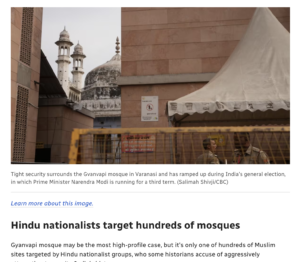Categories
Archives

A few months in, things are going very well for the IPTC’s new Media Provenance Committee.
The IPTC Committee was initiated to continue the work started by Project Origin to bring the benefits of C2PA provenance technology to the news media industry. The Committee is chaired by Bruce MacCormack of CBC / Radio Canada.
The Committee has initiated three Working Groups who will be looking at specific issues:
- The Provenance Governance Working Group, led by Charlie Halford of the BBC.
- The Provenance Best Practices and Implementation Working Group, led by Helge O. Svela of Media City Bergen.
- The Provenance Advocacy and Education Working Group, led by Judy Parnall of the BBC.
We have also started the process of onboarding participants for the next phase of the Origin Verified News Publishers List, and have had several organisations already apply.
The first publishers on the list, BBC and CBC/Radio Canada, have already published some C2PA-signed content:
- The BBC has published some images and video with C2PA-embedded metadata showing the fact-checking process that has been undertaken by the BBC Verify fact-checking team.
- CBC / Radio Canada has published images signed with the CBC certificate on the cbc.ca website.
We are planning several events in the future to promote our work and encourage more in the media industry to get involved. Look out for news about IPTC Media Provenance work at the IBC Conference in Amsterdam in September and at other events.
If your organisation would like to be added to the list in the next phase or in the future, please get in touch!

The IPTC has long worked with organisations on schemas for representing news and media content in all of their forms.
Back in early 2022, the IPTC started hosting the BBC Ontologies, a set of semantic web vocabularies created between 2012 and 2014 that can be used to describe news content, sports, TV and radio programmes and more. When the BBC stopped hosting them in late 2021, IPTC offered to host them on the BBC’s behalf.
“I’m very grateful to the IPTC for providing hosting for these ontologies while we perform some maintenance on their former home,” said Jeremy Tarling, Head of Content Metadata for the BBC, at the time. “For those BBC ontologies relevant to IPTC’s mission we would be keen to discuss longer-term arrangements for their hosting and ownership.”
Since then we have added the SNaP Ontology, a similar semantic web ontology created by the UK’s national news agency PA Media (known at the time as the Press Association). The SNaP ontology was similarly left without a home after the PA brand change.
“We are delighted for the SNaP Ontologies to find their home with the IPTC and its community,” said Steve Robinson, Director of Technology, PA Media Group. “It is our hope that these ontologies, complemented by other member contributions, will support the IPTC’s continued evolution of digital news standards.”
While neither of these standards are being actively developed, we at the IPTC think that they should be accessible to researchers, architects and developers in the future who may want to draw upon their concepts and vocabularies.
In fact, the BBC Sport Ontology is being used as one of the sources of inspiration for IPTC’s forthcoming sports data ontology, which will be announced soon.
With that in mind, the IPTC is willing to host other data schemas and specifications, especially those that are no longer hosted by their creators. If you have suggestions for resources that we should host in our third party area, please let us know.